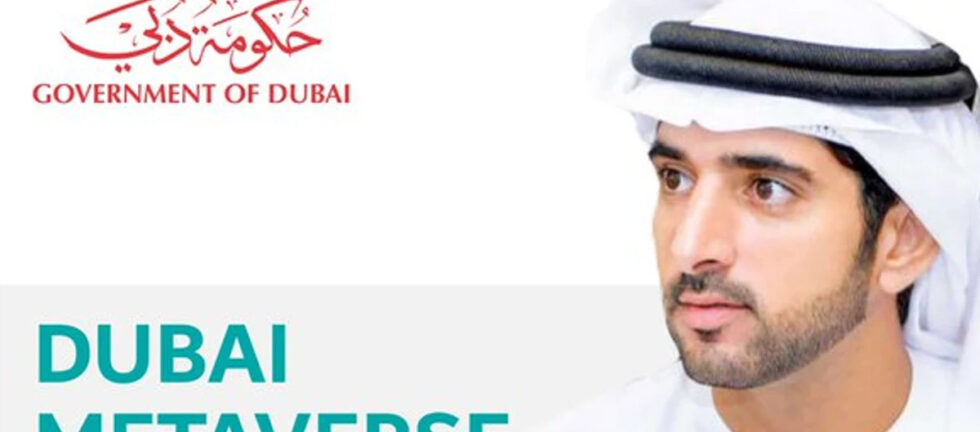Dubai Metaverse Strategy. How to Navigate Metaverse Economy.
The metaverse could contribute $3 trillion (€2.8 trillion) to the global GDP within a decade if it evolves in the same way mobile technology has in terms of adoption and would lead to a 2.8 per cent contribution to global GDP by 2031 according to new research published by economic experts at international consulting firm Analysis Group.
The metaverse is having its moment internationally, accelerated by COVID-19’s impact on digital-based economies and disruptions to offline business models. The rise of blockchain, digital assets, and nonfungible tokens (NFTs) further fuels the demand for the metaverse.
Defined as a virtual-reality space in which users can interact, the metaverse is evolving into an increasingly vast and rich ecosystem that comprises metaverse gateways, platforms and infrastructures, as well as a variety of service providers to enhance the customer experience with identity, social, gaming and economic services.
It is estimated that by 2026 approximately a quarter of the world’s population will spend at least one hour a day in the metaverse, according to Metaverse Hype, a study by the Gartner Institute.
UAE, DUBAI ANNOUNCED METAVERSE STRATEGY
Dubai’s Crown Prince and Prime Minister have together launched their Dubai metaverse strategy, aiming to turn the Middle Eastern city into one of the world’s top metaverse economies as well as a global hub for the metaverse community. Leaders of Dubai want the most populous city in the United Arab Emirates (UAE) to become one of the world’s top 10 metaverse economies.
- Dubai is seeking to break into the world’s top 10 metaverse economies under a new strategy that envisions the sector supporting as many as 40,000 additional virtual jobs and adding $4 billion to the city’s GDP in five years.
- The government aims to develop global standards in building safe and secure platforms for users and develop infrastructure and regulations to accelerate the adoption of these technologies, state-run WAM news agency said.
- The plan, launched by Dubai Crown Prince Sheikh Hamdan bin Mohammed, aims to support the government’s goal of increasing the number of blockchain companies by five times in five years. Dubai is already home to over 1,000 companies in the metaverse and blockchain sector, which contributes $500 million to the national economy, quoted by Sheikh Hamdan.
- A 2020 PricewaterhouseCoopers (PwC) report said that VR and AR technology could add $4 billion to the UAE economy by 2030.
- Meanwhile, Dubai has already been trying to attract cryptocurrency companies from around the world. Some of the world’s biggest crypto and fintech firms including Binance and FTX have been granted licenses in the city.
- “The strategy emphasizes fostering talent and investing in future capabilities by providing the necessary support in metaverse education aimed at developers, content creators and users of digital platforms in the metaverse community,” WAM said.
- The city’s biggest companies are already stepping into the metaverse. Emirates has said it will expand use of the technology, while Damac Group plans to build digital cities. Healthcare firm Thumbay will roll out a hospital in the metaverse for virtual consultations over the next few months, Khaleej Times reported.
HOW TO NAVIGATE METAVERSE ECONOMY
- A customer-first economy
The new economic dynamics in the metaverse are rapidly creating an on-demand economy. Any company or creator looking to do business in the metaverse will need a digital-forward mindset that puts the customer first.
- A business’ success in the metaverse economy is determined by its creativity
The metaverse promises an era in which creativity will drive the economy as professionals in a wide variety of disciplines carry over their existing skills. Virtual success will require more than just creativity. Ventures in the metaverse must adopt a user-centric mindset and innovate around a decentralized, transparent business model.
Standing out and grabbing user attention in the metaverse could be as complex as creating something that no one has ever seen before, or it could also mean offering a subtle point of difference compared to one’s competitors.
- The metaverse proves that our existence is not limited to our physical world, and the world has limitless potential.
In this virtual world, parallel to our real lives, people will engage in work, leisure, shopping, education, and entertainment activities, among others. Serving communities in this virtual environment that simulates the real world, where people are represented by their avatars, will require, among other things, an improved customer journey.
- The metaverse economy is affected by the real economy
While at first glance the metaverse seems to be a standalone economy, it is in fact still connected to – and in fact, dependent on – the successful functioning of the real economy. Essentially, all metaverse funding and withdrawals are tied to the real economy – fiat currencies are used to pay for virtual assets, and virtual assets only materialize into real-world worth when users “cash-out” with hard currency in hand or in their bank account. Therefore, businesses should be aware that their metaverse activities will forever be linked to the traditional economy – an extension of their real-world dealings.
- Metaverse business partnerships are vital to survive
While the metaverse economy holds immense potential and myriad opportunities, it requires knowledge and expertise to navigate and build a sustainable business in the space. Achieving success in the metaverse economy hinges on keeping in mind that this new virtual world is impacted by the real world, understanding that partnerships are key to survival, and utilizing creativity to stand out from the competition.
Businesses can look to partnering with companies that already have these skills, leveraging strengths collaboratively in order to bring a robust offering to the market and providing a buffer should anything go wrong. The metaverse economy has not yet reached a stage of maturity, so investors and businesses should also make use of advisors that have experience in the space and can offer guidance on how to skillfully navigate any pitfalls.
THE METAVERSE ON BLOCKCHAIN
Metaverse will keep a record of everything that is bought, sold, and traded on a blockchain ledger. Your purchases—even if they are only a bunch of digital pixels—reveal an immutable proof of ownership. And that’s where things get complicated.
To own something in the metaverse you need a digital wallet. And the wallet can’t be filled with cash or credit cards, since transactions need to be recorded on the blockchain. This requires opening a crypto account (Ethereum is the de facto standard but there are plenty of new wannabes—such as Solana and Terra—as the currency for the metaverse). To fill Crypto into your wallet you’ll need to go to exchanges like Binance or Coinbase where you can exchange your fiat currency for an equivalent amount of cryptocurrency.
ENTER NFTS: THE TICKET TO THE METAVERSE
If the metaverse is an immersive destination and crypto currency is what you’ll spend while you’re there, one of the most important assets in this new world are NFTs. NFTs are basically tokenized digital representations of everything from artwork to fashion, to event tickets, games. They can even be used as tickets, redeemable for experiences in both the physical and virtual world. Once purchased they are part of your digital portfolio.
Depending on how an NFT is coded, once you own it you can unlock member-only experiences, buy and trade or just show it off.
HOW METAVERSE IMPACT OVERALL ECONOMIC GROWTH
Beyond everything else, the Metaverse will support overall economic growth. The Metaverse is a reflection of the real world. It will support the people, places, and experiences that constitute society, a separate virtual economy with virtual jobs that create real value.
The sheer number of opportunities for income generation in the Metaverse is difficult to comprehend, and the global economy is about to grow exponentially. And the best part is, in a virtual world, there are no limits.
The Covid-19 pandemic did a lot to shift attitudes to remote working. The Metaverse will enable the capabilities of remote work platforms to grow exponentially. Users will be able to access complete office suites, interact with colleagues regardless of location. This advancement will expand the employment options for workers in every community and jurisdiction, funneling cash into economies that may not have received it before.
The development of the metaverse economic system will incrementally change the financial industry through both steady changes and bursts of innovation. Business leaders should start by considering how their brands might connect with specific metaverse communities and inspire trust and loyalty.
References:
https://observer.com/2022/04/the-metaverse-is-getting-huge-but-how-will-its-money-work/
https://www.nasdaq.com/articles/understanding-the-metaverse-economy-and-how-to-navigate-it

Alia Noor (FCMA, CIMA, MBA, GCC VAT Comp Dip, Oxford fintech programme, COSO Framework)
Associate PartnerAhmad Alagbari Chartered Accountants






